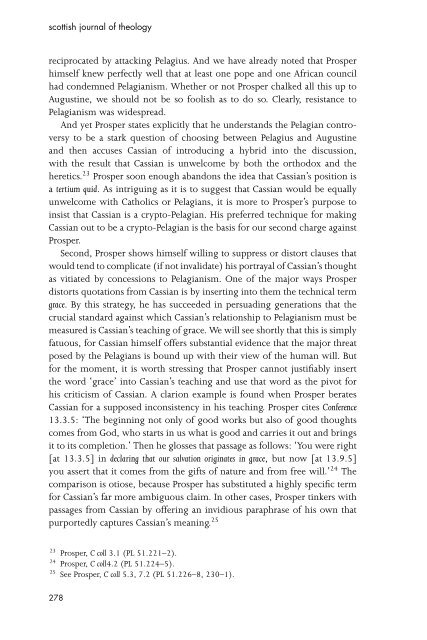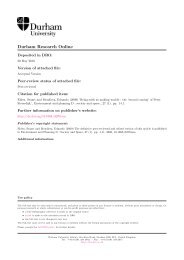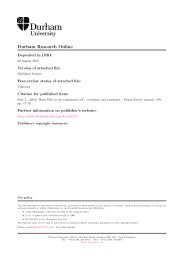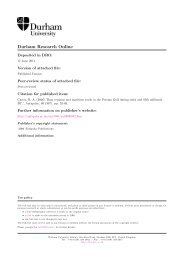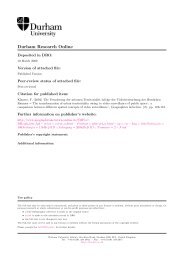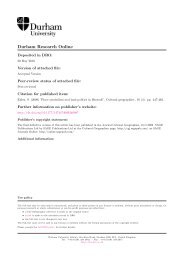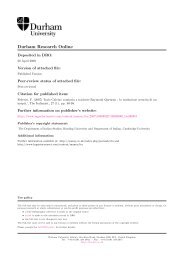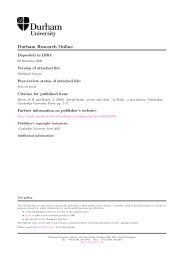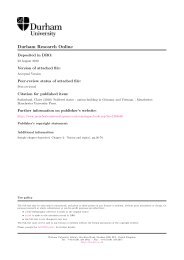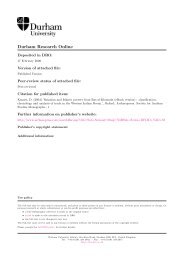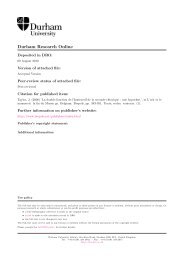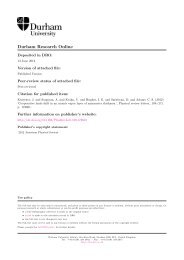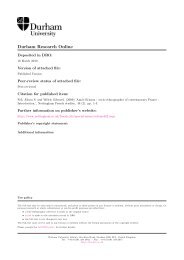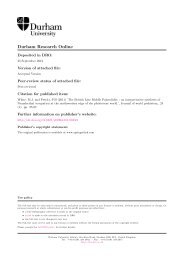Rehabilitating John Cassian: an evaluation of Prosper of Aquitaine's ...
Rehabilitating John Cassian: an evaluation of Prosper of Aquitaine's ...
Rehabilitating John Cassian: an evaluation of Prosper of Aquitaine's ...
Create successful ePaper yourself
Turn your PDF publications into a flip-book with our unique Google optimized e-Paper software.
scottish journal <strong>of</strong> theology<br />
reciprocated by attacking Pelagius. And we have already noted that <strong>Prosper</strong><br />
himself knew perfectly well that at least one pope <strong>an</strong>d one Afric<strong>an</strong> council<br />
had condemned Pelagi<strong>an</strong>ism. Whether or not <strong>Prosper</strong> chalked all this up to<br />
Augustine, we should not be so foolish as to do so. Clearly, resist<strong>an</strong>ce to<br />
Pelagi<strong>an</strong>ism was widespread.<br />
And yet <strong>Prosper</strong> states explicitly that he underst<strong>an</strong>ds the Pelagi<strong>an</strong> controversy<br />
to be a stark question <strong>of</strong> choosing between Pelagius <strong>an</strong>d Augustine<br />
<strong>an</strong>d then accuses <strong>Cassi<strong>an</strong></strong> <strong>of</strong> introducing a hybrid into the discussion,<br />
with the result that <strong>Cassi<strong>an</strong></strong> is unwelcome by both the orthodox <strong>an</strong>d the<br />
heretics. 23 <strong>Prosper</strong> soon enough ab<strong>an</strong>dons the idea that <strong>Cassi<strong>an</strong></strong>’s position is<br />
a tertium quid. As intriguing as it is to suggest that <strong>Cassi<strong>an</strong></strong> would be equally<br />
unwelcome with Catholics or Pelagi<strong>an</strong>s, it is more to <strong>Prosper</strong>’s purpose to<br />
insist that <strong>Cassi<strong>an</strong></strong> is a crypto-Pelagi<strong>an</strong>. His preferred technique for making<br />
<strong>Cassi<strong>an</strong></strong> out to be a crypto-Pelagi<strong>an</strong> is the basis for our second charge against<br />
<strong>Prosper</strong>.<br />
Second, <strong>Prosper</strong> shows himself willing to suppress or distort clauses that<br />
would tend to complicate (if not invalidate) his portrayal <strong>of</strong> <strong>Cassi<strong>an</strong></strong>’s thought<br />
as vitiated by concessions to Pelagi<strong>an</strong>ism. One <strong>of</strong> the major ways <strong>Prosper</strong><br />
distorts quotations from <strong>Cassi<strong>an</strong></strong> is by inserting into them the technical term<br />
grace. By this strategy, he has succeeded in persuading generations that the<br />
crucial st<strong>an</strong>dard against which <strong>Cassi<strong>an</strong></strong>’s relationship to Pelagi<strong>an</strong>ism must be<br />
measured is <strong>Cassi<strong>an</strong></strong>’s teaching <strong>of</strong> grace. We will see shortly that this is simply<br />
fatuous, for <strong>Cassi<strong>an</strong></strong> himself <strong>of</strong>fers subst<strong>an</strong>tial evidence that the major threat<br />
posed by the Pelagi<strong>an</strong>s is bound up with their view <strong>of</strong> the hum<strong>an</strong> will. But<br />
for the moment, it is worth stressing that <strong>Prosper</strong> c<strong>an</strong>not justifiably insert<br />
the word ‘grace’ into <strong>Cassi<strong>an</strong></strong>’s teaching <strong>an</strong>d use that word as the pivot for<br />
his criticism <strong>of</strong> <strong>Cassi<strong>an</strong></strong>. A clarion example is found when <strong>Prosper</strong> berates<br />
<strong>Cassi<strong>an</strong></strong> for a supposed inconsistency in his teaching. <strong>Prosper</strong> cites Conference<br />
13.3.5: ‘The beginning not only <strong>of</strong> good works but also <strong>of</strong> good thoughts<br />
comes from God, who starts in us what is good <strong>an</strong>d carries it out <strong>an</strong>d brings<br />
it to its completion.’ Then he glosses that passage as follows: ‘You were right<br />
[at 13.3.5] in declaring that our salvation originates in grace, but now [at 13.9.5]<br />
you assert that it comes from the gifts <strong>of</strong> nature <strong>an</strong>d from free will.’ 24 The<br />
comparison is otiose, because <strong>Prosper</strong> has substituted a highly specific term<br />
for <strong>Cassi<strong>an</strong></strong>’s far more ambiguous claim. In other cases, <strong>Prosper</strong> tinkers with<br />
passages from <strong>Cassi<strong>an</strong></strong> by <strong>of</strong>fering <strong>an</strong> invidious paraphrase <strong>of</strong> his own that<br />
purportedly captures <strong>Cassi<strong>an</strong></strong>’s me<strong>an</strong>ing. 25<br />
23 <strong>Prosper</strong>, Ccoll3.1 (PL 51.221–2).<br />
24 <strong>Prosper</strong>, Ccoll4.2 (PL 51.224–5).<br />
25 See <strong>Prosper</strong>, Ccoll5.3, 7.2 (PL 51.226–8, 230–1).<br />
278


